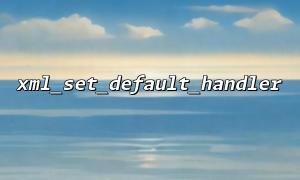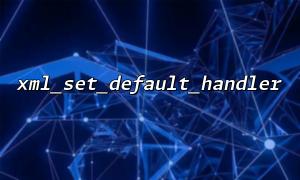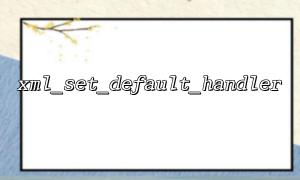When working with PHP's XML parsing features, xml_set_default_handler is a valuable function for setting a default callback handler to process any unmatched XML elements or text during parsing. If your callback function isn’t being triggered, there could be several reasons. This article analyzes common causes and offers practical solutions.
When using xml_set_default_handler, your callback must adhere to PHP’s expected function signature. If the callback is incorrectly defined, PHP will ignore it, and it won’t trigger. The callback should accept two parameters:
function defaultHandler($parser, $data) {
echo "Default handler triggered: " . htmlspecialchars($data) . "\n";
}
Here’s what the parameters mean:
$parser is the XML parser resource.
$data is the text content not handled by other callbacks.
Make sure your callback accepts these two parameters, even if you don’t use the first one.
xml_set_default_handler only triggers when there is content in the XML that is not handled by more specific callbacks. For instance, if you have xml_set_element_handler or xml_set_character_data_handler defined, the default handler will only be called for content not processed by those. If every element and piece of data is explicitly handled, the default callback won’t be triggered.
Solution: Ensure that some content is left unhandled by specific callbacks, or review your use of other handlers.
If the XML itself has formatting issues, the parser may halt prematurely, never reaching a point where xml_set_default_handler would trigger. Illegal characters or improperly formed tags can cause such problems. In that case, the default handler won’t be executed.
Solution: Validate the XML format. Use libxml_use_internal_errors(true) to enable internal error tracking and capture any parsing issues:
libxml_use_internal_errors(true);
$parser = xml_parser_create();
xml_set_default_handler($parser, 'defaultHandler');
If xml_set_default_handler is registered before the parser is created, or the registration order is incorrect, the callback may not be recognized. Always register your callbacks before calling xml_parse.
$parser = xml_parser_create();
xml_set_default_handler($parser, 'defaultHandler');
xml_parse($parser, $xmlData);
If the parser is inactive or already shut down when xml_parse is called, the xml_set_default_handler won’t be triggered. Make sure the parser is correctly initialized and all callbacks are registered before parsing begins.
Different PHP versions or configurations might affect XML parsing behavior. If the XML extension is disabled or outdated, xml_set_default_handler might not work as expected.
Solution: Check your PHP version and make sure the XML extension is enabled. Use phpinfo() to review the relevant configuration details.
If your xml_set_default_handler callback isn't firing, it could be due to issues with the function definition, registration order, XML content, parser status, or PHP configuration. By carefully checking these common causes, you can effectively resolve the issue. Ensuring your callback is correctly defined, your XML is well-formed, and handlers are registered at the right moment will help you avoid such problems.



